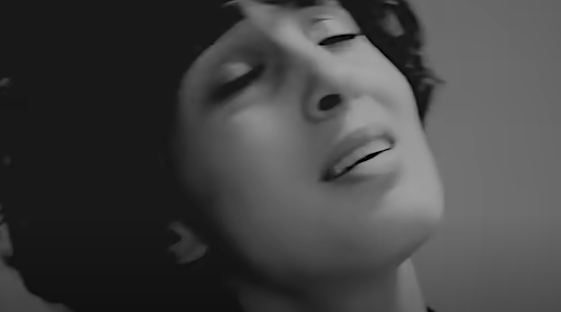
Given ethnomusicologists’ taste for all manifestations of the Terpsichorean muse, Eurovision has become a fashionable topic, * but with my head buried in Daoist ritual practice, I’ve always given it a miss (“Call Me Old-Fashioned”).
So it was only when watching the presentations after the French Open women’s singles final this weekend that I was enticed to explore the ouevre of the beguiling Parisian chanteuse Barbara Pravi. **

For the Roland Garros organisers, inviting her to perform her recent Eurovision song Voilà may have ticked the boxes, but she matched the intensity of the players’ speeches, with her lyrics (see below) affirming their own strivings; the occasion gave her song a personal, almost informal touch that the streamlined Eurovision inevitably lacks (see this clip). Paying attention to context, even her chic outfit was artfully chosen, as a fan notes:
Barbara was a vision of summer in bright yellow [Dior, I gather]. Her high-rise pleated skirt helped define her silhouette, while her oversized short sleeves gave it added drama. Barbara, who is famously petite [sic], added height with a pair of super-tall platform heels with black straps around the ankles. She wore white booty socks, which brought a sporty element to the elegant look.
Here’s the official video of Voilà:
Again, it benefits from a more intimate setting:
Moi la chanteuse à demi
Parlez de moi
À vos amours, à vos amis
Parler leur de cette fille aux yeux noirs et de son rêve fou
Moi c’que j’veux c’est écrire des histoires qui arrivent jusqu’à vous
C’est tout
Me voilà même si mise à nue j’ai peur, oui
Me voilà dans le bruit et dans le silence
Regardez moi, avant que je me déteste
Quoi vous dire, que les lèvres d’une autre ne vous diront pas
C’est peu de chose mais moi tout ce que j’ai je le dépose là, voilà
Me voilà même si mise à nue c’est fini
C’est ma gueule c’est mon cri, me voilà tant pis
Voilà, voilà, voilà, voilà juste ici
Moi mon rêve mon envie, comme j’en crève comme j’en ris
Me voilà dans le bruit et dans le silence
Ça m’sauvera peut-être pas, non
Mais faire sans vous j’sais pas comment
Aimez moi comme on aime un ami qui s’en va pour toujours
J’veux qu’on m’aime parce que moi je sais pas bien aimer mes contours
Me voilà même si mise à nue c’est fini
Me voilà dans le bruit et dans la fureur aussi
Regardez moi enfin et mes yeux et mes mains
Tout c’que j’ai est ici, c’est ma gueule c’est mon cri
Me voilà, me voilà, me voilà
Voilà, voilà, voilà, voilà
Though the French entry came second in Eurovision 2021 (“nous wuz robbé”), it was France’s highest-ever score. The song is consistent with the contest’s decisive shift in favour of minor keys over the last twenty years—conveying gravitas to offset the kitsch of the occasion, or even reflecting political unrest?
We Brits are so used to failing dismally in the contest that nul points has long been a widely-known French expression. This under-achievement is discussed in a Twitter thread, and at the start of this episode of BBC Radio 4’s More or less. Despite the old slur of Das Land ohne Musik, it’s an intriguing political and musical issue. It may be seen partly as a reaction against the global dominance of Anglo-American pop; while it predates any disillusion with Brexit among “our European friends”, it may feed into British conservatives’ harrumphing over loss of empire. But other factors are more significant.
Talking of international multi-dimensionality, perhaps we might see Eurovision as a Handel opera, with the recitatives replaced by other boring longueurs. For the Azeri entry, see here.
Back with Barbara Pravi, her father is of Serbian and Algerian Jewish descent, her mother of Polish-Jewish and Iranian origin—I note this with no small envy, since my own parents hailed from the exotic climes of Surbiton and Chippenham (cf. “Palm trees are nothing to us—we’re from Torquay”). She discusses her Persian heritage in this interview (from 6.31).
And I’m most taken with her recent Les Prières for International Women’s Day; this playlist includes all six songs:
including Prière à l’éphémère, inspired by Rumi:
So this post complements my other hommages to French chanson, such as Rameau, Berlioz, Ravel (here and here), Debussy, Michel Legrand, Françoise Hardy, and, um, Pierre Boulez.
For thoughtful perspective on Ukraine’s Eurovision successes in 2004 and 2016, see here. For traditional Iranian singing, click here; for wise critiques of artistic competition, here; and do enjoy A flat miner! For broader perspectives, see What is serious music?!, Society and soundscape, and for gender and music, Feminine endings and Flamenco 2.
* See e.g. Dafni Tragaki (ed.), Empire of song: Europe and nation in the Eurovision Song Contest (2013), reviewed here.
** One might expect the drôlerie à demi of my heading “Ravi par Pravi” to be a staple of the French tabloids, but its apparent absence there rather confirms Kate Fox’s observations on the British propensity for headline punning. At least we can win at that.
